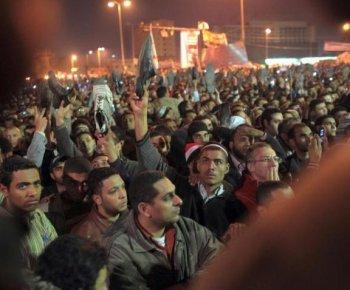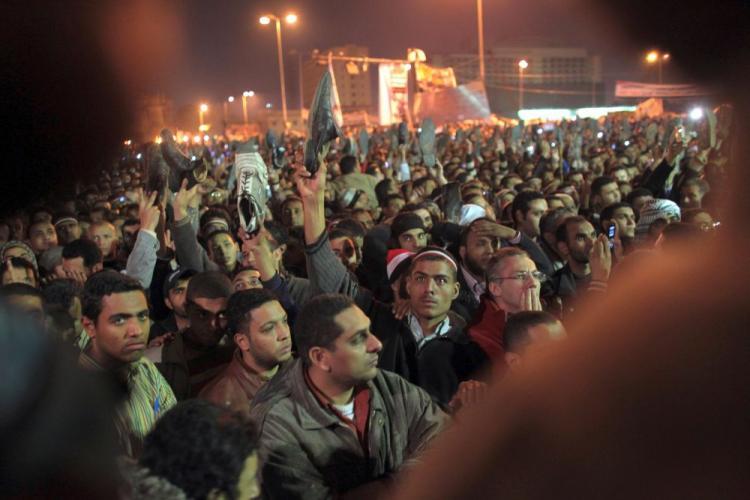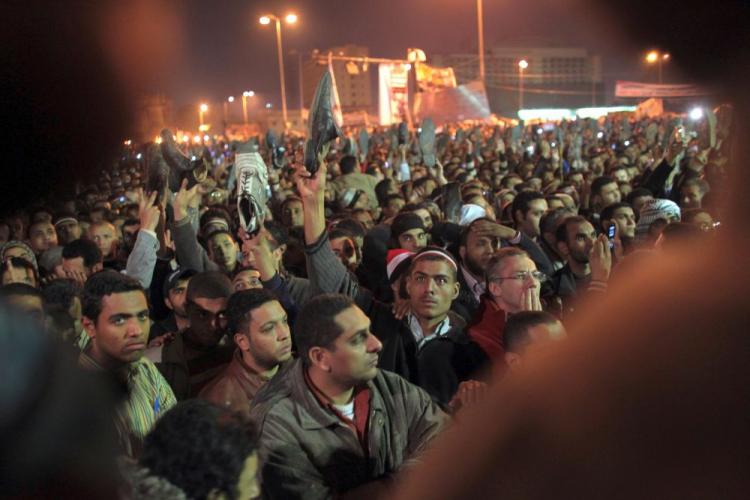Update: Egyptian President Hosni Mubarak has resigned, handing power over to the military.
Just what type of government will emerge from the Egypt turmoil—and the fallout the crisis will have—are mysteries the world waits to have answered.
What is known, however, is that while protests rage, the Muslim Brotherhood waits on the sidelines. Being the only organized faction of the opposition, the Islamic movement could redirect the transition to free democracy, and lead the country to become an Islamic regime similar to Iran and others in the region.
“They’re kind of laying low while this is going on, because after all, the young people are doing the work for them,” said Jack Winnick, expert on nuclear weaponry and chemical engineering, and professor emeritus in chemical engineering at Georgia University, in a phone interview.
“Every revolution works like that—let the masses do the work for you, then when they’re searching for a leader they’ll come to the entity that has the most power,” Winnick said.
Concern over Egypt’s teetering fate is shared by many experts, as the world watches events unfold.
Protests calling for the ousting of Mubarak began on Jan. 25; being organized mostly by Egypt’s youth through social networking sites including Facebook and Twitter. The protesters have little official organization among themselves.
By joining the voices of the protesters, the Muslim Brotherhood has become the largest organized group among them, and has already joined negotiations over the transitional government with Egyptian Vice President Omar Suleiman. Given the Muslim Brotherhood’s support of the opposition, “I think a lot of the young people will step in behind them once they take hold,” Winnick said.
Founded in 1928, the Muslim Brotherhood was outlawed in Egypt in 1954, following an attempt to assassinate former Egyptian President Gamal Abdel Nasser. “Although it has changed its tactics, it retains the long-term goal of creating an Islamist state that would be an enemy of freedom,” states a report from The Heritage Foundation by James Phillips.
Offshoots of the organization have taken on more extreme roles. Among them are the Egyptian Islamic Jihad, which has launched several terrorist attacks in Egypt and assassinated President Anwar Sadat in 1981; and Palestinian Islamist extremist group Hamas, which launches regular attacks against Israel, according to the report.
While Mubarak “crushed the secular opposition,” he allowed the Muslim Brotherhood to exist, “just enough to scare the U.S. and other Western nations into buying its line that only Mubarak stood between the Islamists and power,” states the report.
It adds, “The Muslim Brotherhood’s strategy is to lie low in the current crisis and work behind the secular gadfly Mohamed ElBaradei, a spokesman for the broad opposition coalition,” while the Brotherhood moves “to transform the disjointed popular revolt into a draconian Islamist revolution.”
The potential implications could affect not only Egypt, but also countries across the Middle East, and the United States.
“Just look at what happened to Iran,” Winnick said. “Pretty soon after Iran went over in 1979 there are problems in Pakistan and Afghanistan. Then al-Qaeda, based in Afghanistan, were the ones who launched the attack on 9/11. So when we have governments that are friendly with the terrorists, it puts us at tremendous risk.”
Winnick said his main concern is that if the Muslim Brotherhood gains power, it could assist terrorist groups in obtaining materials for a nuclear weapon. “If you have a government led by the Muslim Brotherhood, they can funnel the money, the material, and the people into a terrorist group that has those kinds of goals,” he said.
“The more control they have over the Middle Eastern governments, the bigger the problem we have,” he added.
With Egypt’s fate is still undecided, however, it could also lean toward a more free and open society.
“It’s impossible to predict exactly what will happen,” said Gary Sick, senior research scholar and adjunct professor of international and public affairs, in an interview with Sound of Hope radio.
A key factor is what position the Egyptian army will take, since “a lot of it depends on the goodwill of the army and its willingness to change a system that has been in place for over 60 years,” Sick said.
If it takes over the transition of the regime and cooperates in establishing a constitution and a fair democratic election, the result could be good. If the army takes over, the outcome could lean the other way.
According to Sick, however, there is a unique factor at play in Egypt. Since opposition was suppressed over the last 60 years, individuals who stood up were often exiled or killed.
“At this point there are a lot of people, very talented people in Egypt, who have never had an opportunity to express themselves publicly,” he said. “Those people are going to pop up, and they are going to be voices of political leadership that we’ve never heard of before. That might be a good thing.”
“This is going to be a period of great change, whatever happens, and tremendous evolution, I guess, in terms of the foreign policies of all the countries in that region, and the countries on the outside that have interest there,” he said. “It’s going to be earthshaking, no matter how things turn out.”
Just what type of government will emerge from the Egypt turmoil—and the fallout the crisis will have—are mysteries the world waits to have answered.
What is known, however, is that while protests rage, the Muslim Brotherhood waits on the sidelines. Being the only organized faction of the opposition, the Islamic movement could redirect the transition to free democracy, and lead the country to become an Islamic regime similar to Iran and others in the region.
“They’re kind of laying low while this is going on, because after all, the young people are doing the work for them,” said Jack Winnick, expert on nuclear weaponry and chemical engineering, and professor emeritus in chemical engineering at Georgia University, in a phone interview.
“Every revolution works like that—let the masses do the work for you, then when they’re searching for a leader they’ll come to the entity that has the most power,” Winnick said.
Concern over Egypt’s teetering fate is shared by many experts, as the world watches events unfold.
Protests calling for the ousting of Mubarak began on Jan. 25; being organized mostly by Egypt’s youth through social networking sites including Facebook and Twitter. The protesters have little official organization among themselves.
By joining the voices of the protesters, the Muslim Brotherhood has become the largest organized group among them, and has already joined negotiations over the transitional government with Egyptian Vice President Omar Suleiman. Given the Muslim Brotherhood’s support of the opposition, “I think a lot of the young people will step in behind them once they take hold,” Winnick said.
Founded in 1928, the Muslim Brotherhood was outlawed in Egypt in 1954, following an attempt to assassinate former Egyptian President Gamal Abdel Nasser. “Although it has changed its tactics, it retains the long-term goal of creating an Islamist state that would be an enemy of freedom,” states a report from The Heritage Foundation by James Phillips.
Offshoots of the organization have taken on more extreme roles. Among them are the Egyptian Islamic Jihad, which has launched several terrorist attacks in Egypt and assassinated President Anwar Sadat in 1981; and Palestinian Islamist extremist group Hamas, which launches regular attacks against Israel, according to the report.
While Mubarak “crushed the secular opposition,” he allowed the Muslim Brotherhood to exist, “just enough to scare the U.S. and other Western nations into buying its line that only Mubarak stood between the Islamists and power,” states the report.
It adds, “The Muslim Brotherhood’s strategy is to lie low in the current crisis and work behind the secular gadfly Mohamed ElBaradei, a spokesman for the broad opposition coalition,” while the Brotherhood moves “to transform the disjointed popular revolt into a draconian Islamist revolution.”
The potential implications could affect not only Egypt, but also countries across the Middle East, and the United States.
“Just look at what happened to Iran,” Winnick said. “Pretty soon after Iran went over in 1979 there are problems in Pakistan and Afghanistan. Then al-Qaeda, based in Afghanistan, were the ones who launched the attack on 9/11. So when we have governments that are friendly with the terrorists, it puts us at tremendous risk.”
Winnick said his main concern is that if the Muslim Brotherhood gains power, it could assist terrorist groups in obtaining materials for a nuclear weapon. “If you have a government led by the Muslim Brotherhood, they can funnel the money, the material, and the people into a terrorist group that has those kinds of goals,” he said.
“The more control they have over the Middle Eastern governments, the bigger the problem we have,” he added.
With Egypt’s fate is still undecided, however, it could also lean toward a more free and open society.
“It’s impossible to predict exactly what will happen,” said Gary Sick, senior research scholar and adjunct professor of international and public affairs, in an interview with Sound of Hope radio.
A key factor is what position the Egyptian army will take, since “a lot of it depends on the goodwill of the army and its willingness to change a system that has been in place for over 60 years,” Sick said.
If it takes over the transition of the regime and cooperates in establishing a constitution and a fair democratic election, the result could be good. If the army takes over, the outcome could lean the other way.
According to Sick, however, there is a unique factor at play in Egypt. Since opposition was suppressed over the last 60 years, individuals who stood up were often exiled or killed.
“At this point there are a lot of people, very talented people in Egypt, who have never had an opportunity to express themselves publicly,” he said. “Those people are going to pop up, and they are going to be voices of political leadership that we’ve never heard of before. That might be a good thing.”
“This is going to be a period of great change, whatever happens, and tremendous evolution, I guess, in terms of the foreign policies of all the countries in that region, and the countries on the outside that have interest there,” he said. “It’s going to be earthshaking, no matter how things turn out.”







